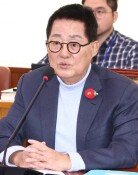Venture company thinks big with solar-powered trash cans
Venture company thinks big with solar-powered trash cans
Posted September. 29, 2012 04:42,
The young CEO of Ecube Labs took a leave of absence from his studies at the electrical engineering department of Yonsei University in Seoul. Kwon Soon-beom, 24, was woken up by his phone one morning in early May.
He hung up the phone after thinking the caller`s strange accent must have belonged to a con artist calling from China. Yet his phone rang again with the same caller number.
Are you making solar bins? The caller with the strange accent was a Middle Eastern buyer who contacted Kwon to place an order for solar trash cans.
At the time, we didnt even have a test product. Yet many overseas buyers read an English-language article about us winning a competition on the Web and began to call us, Kwon said.
Ecube Labs recently raised 36 million won (32,000 U.S. dollars) sales by selling 12 solar bins, or 3 million won (2,700 dollars) for each, to a company in Saudi Arabia. This export was the first revenue for the company.
○ Getting the idea from a trash can in Shinchon
Four people established Ecube in March last year. They had met in 2009 while working as interns for a volunteer organization that provided management consulting for social enterprises. All of them dreamed of starting a business. When they heard about Kwons idea of making a solar bin, they realized the time had come.
Kwon used to live in Shinchon, an area famous among young people for bars and restaurants near Yonsei University. Tons of wastes are generated each night. One day he thought, My trash can at home allows users to press down waste inside. Why dont we have one like that on streets?
Kwon eventually came up with an idea of using solar power to automatically press down the lid of a trash can. He also came up with the idea of letting the trash can automatically notify cleaning staff. Kwon said he thought this will save costs for the responsible authority by allowing it to dispatch workers only when the need arises.
Turning his eureka idea into a product was not easy, however. I had visited many shops in Seouls Cheonggyecheon area asking to make a prototype from my blueprint, which looked like more of a rough sketch. Most engineers thought I was joking.
○ From Seoul to Gyeonggi Province
Each of Ecube`s four founders invested 500,000 won (450 dollars) to rent a shabby office. They then began to visit factories, looking for a plant to make their product. They visited ironware processing factories in the cities of Guri and Namyangju in Gyeonggi Province as well as in the Seoul districts of Guro and Geumcheon, asking questions and learning from engineers in the plants.
Kwon Hyeong-seok, 25, who is taking a break from his business studies at Yonsei University, said, It took us a year to learn enough to draw a design. Obtaining solar modules was even more difficult. They visited every fair on renewable energy across Korea and met people from globally known solar companies such as OCI or Hanwha Group for help.
Kwon said while giggling, Looking back, we didnt even know what kind of products that solar companies produced. We tried to buy solar modules of 30 watts but no solar companies made them.
Opposition from their parents did not help, either. Including Lee Seung-jae, 25, who is taking a break from the chemical and biological engineering department at Seoul National University, all of them were students at prestigious universities and their parents wanted them to settle down either by passing civil service exams or entering a major conglomerate. Kwon said, When I told my father that I wanted to start a business, he told me that this was my last misdeed. My heart was crushed when he said this.
Early this month, however, his father secretly visited Seoul National, Korea and Yonsei universities, where Kwons products were installed, to see the products. After hearing that the solar company Hanwha Chemical gave 100 million won (900,000 dollars) with no precondition to support Ecube, all of the other parents began to support their children`s venture.
○ Keep knocking, the door will open
Competitions and state support for venture businesses have been like a ray of light in the gloomy and clumsy adventure of the four young men.
Lee Seong-gu, 27, a graduate business student at Korea University, said, We had to enter competitions to earn money to invest, but in the process, we learned a lot by getting the chance to see our products more objectively. As a result, we could upgrade our products.
Ecube has secured a combined investment 226 million won (200,000 dollars) from competitions and venture support programs, including a prize of 52 million won (47,000 dollars) in April last year from a competition to nurture future entrepreneurs in the technological industry by the Small and Medium Business Administration.
The young company is targeting countries with vast land and high labor costs as promising customers. Potential buyers are based in Australia and Middle Eastern countries.
Kwon Hyeok-tae, head of the venture capital Coolidge Corner Investment, said, The marketability of solar bins has been verified by increasing demand. For example, certain parts of the U.S. have seen demand for solar trash cans double each year. Ecube Lab products are equipped with information technology, and we think this will propel the sales of the products overseas.
mint4a@donga.com







